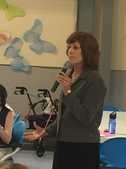|
As nurses, we like to think that we are both strong and caring. But caring has its hardships and can take a toll on our mental health. Compassion Fatigue can set in and we are often unaware or in denial. Even if we are aware, nurses often suppress these feelings because they feel like failures. After all, compassion is core to nursing and sadness is considered part of the job (https://www.medscape.com/viewarticle/913202). In addition to nurses, people who witness constant and sometimes unspeakable suffering such as other healthcare providers, child welfare workers, firemen, and policemen are more prone to this condition. It might also be described as “secondary or vicarious trauma” since those people affected are not experiencing the suffering, but rather they are hearing or seeing it (https://www.stress.org/military/for-practitionersleaders/compassion-fatigue).
Not to be confused with burn-out (which is a cumulative process related to workload and institutional stress), Compassion Fatigue is the “strain of exposure to working with those suffering from the consequences of traumatic events” (https://www.stress.org/military/for-practitionersleaders/compassion-fatigue). It is also not post traumatic stress disorder (PTSD), but rather the providers who care for people with PTSD could experience compassion fatigue. Back in the 1980s, compassion fatigue was first addressed with policing and firefighting and ironically not nursing. Yet Compassion Fatigue often hits the nursing profession the hardest. The suffering experience of some professions is often a single incident, but nurses must “go back into their patients’ rooms” to continue with their care (https://www.medscape.com/viewarticle/913202). In comparison to burn-out, which is typically a more gradual process, Compassion Fatigue tends to have a more rapid onset. But it is still a process and does not happen overnight. You do not bounce from having energy and enjoyment in your life to waking up suddenly exhausted both physically and emotionally. Compassion Fatigue results in a chronic “clouding of the caring and concern for others in your life. ” You may experience what is called an “emotional blunting” according to Dr. F. Oshberg with the American Institute of Stress. If you find yourself feeling burdened by the suffering of others, be in tune to other symptoms of Compassion Fatigue:
With the progression of Compassion Fatigue studies, researchers realized that the general public is affected as well. With media and social media providing tragic stories 24/7, people in society are hearing and seeing the suffering of many people all over the world. Compassion Fatigue has become a societal problem. “Tips for Managing Compassion Fatigue” Do:
Do Not:
We cannot forget the caregivers. Many loved ones, family and trained staff who are caring for the sick – some with severe suffering or tragedies – are prone to developing Compassion Fatigue. Mother Teresa understood this role and the signs of Compassion Fatigue. She made it mandatory for her nuns to take a break for an entire year for every 4-5 years of care-giving work (https://www.psychologytoday.com/us/blog/somatic-psychology/201207/compassion-fatigue). For those compassionate people in the caring business, it helps to establish a heightened awareness of this potential problem http://compassionfatigue.org/pages/compassionfatigue.html). It doesn’t mean you necessarily have to leave the business of caring behind, but rather you want to practice healthy self-care and know when you need to take a break, set boundaries, or step away from some situations causing Compassion Fatigue. Charles Figley, PhD, who has written books on the subject and covers the identification of the condition, research, treatment and preventative measures summarizes Compassion Fatigue eloquently: “We have not been directly exposed to the trauma scene, but we hear the story told with such intensity, or we hear similar stories so often, or we have the gift and curse of extreme empathy and we suffer. We feel the feelings of our clients. We experience their fears. We dream their dreams. Eventually, we lose a certain spark of optimism, humor and hope. We tire. We aren’t sick, but we aren’t ourselves.” (http://www.giftfromwithin.org/html/What-is-Compassion-Fatigue-Dr-Charles-Figley.html) Charlotte Michos is a clinical nurse specialist who values personal-centered care and serves as a Healthcare Consultant in helping others make informed decisions. For more information call (845) 548-5980
0 Comments
Your comment will be posted after it is approved.
Leave a Reply. |
Please check back often.
© 2022 Charlotte Michos. LLC All rights reserved. Please contact Charlotte for permission to republish. Archives
March 2022
Categories |


 RSS Feed
RSS Feed